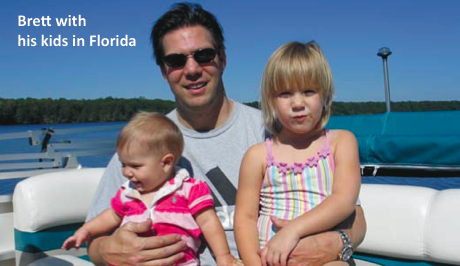We asked Brett a few of the “Big” questions in life. Here’s what he said…
Do you have an overall philosophy?
My overall philosophy is to make a positive difference and improve the financial situation in all the lives I touch. Towards that goal, I seek out truth. My test of truth is it was true yesterday; it is true today and will be true tomorrow.
How do you handle conflict?
Do not fight or argue. A wise man once said, “A man’s opinion changed against his will is of the same opinion still.” Do not reason with an angry man, as they are not listening. They are not ready to consider other perspectives. Hear what is in people’s hearts without clouding your view with your own self-interests. People do not know what they do not know. As a result, beliefs, biases, conclusions and decisions are destined for problems. Try and view things from the perspective of others before judging adverse responses to other’s perspectives. Maybe they are right and you are wrong.
How has being married changed you?
A. We are all made different, but the different perspective will create a better result, viewed from both sides. Once in a while, the difference will drive you crazy, but it’s O.K. I am lucky to have Nikki as my wife and she has contributed greatly to my ability to see something from someone else’s perspective.
How do you have fun?
Don’t limit your emotional age to your physical age. Instead, use your best age to match to the experience. Happiness is not found in the goal or milestone, but it’s in the pursuit or journey. Maintain a youthful love of life. Enjoy the ride! Be present and truly listen rather than spending your time thinking about a response. Life is about Magic moments. Accumulate them. Create them for others. Our enjoyment is measured upon the number of magic moments we have and give.
Do you still try to develop yourself? How?
Study both failures and successes to better understand the potential blind spots. Consider using Ben Franklin’s method to improve character. He took each point and focused on it for a week. So, in a year, you have worked on each one four times!
Here is Ben’s List:
- Temperance. Eat not to dullness, drink not to elevation.
- Silence. Speak not but to benefit others or yourself. Avoid trifling conversation.
- Order. Let all things have their place and each part of your business have its time.
- Resolution. Results perform what you aught, perform without fail what you resolve.
- Frugality. Make no expense to do good for others or yourself. Waste nothing.
- Industry. Waste not of time, be always employed in something useful, and cut out unnecessary actions.
- Sincerity. Use no harmful deceit. Think innocently and justly, and if you speak, speak and act accordingly.
- Justice. Wrong none by doing no injuries or omit- ting the benefits that are your duty.
- Moderation. Avoid extremes; forbear resenting in- juries so much as you think they deserve.
- Clean. Tolerate no uncleanliness in body, clothes or habitation.
- Tranquility. Be not disturbed by others trifles or at accidents common or unavoidable.
- Chastity. Rarely use venery.
- Humility. Imitate Jesus and Socrates.
Do you learn from your mistakes?
According to Tony Robbins “When people do well they party, when they fail they ponder.” I have learned more from my pondering (i.e. failures) by a factor of 10. Don’t let a life lesson go unlearned and don’t be afraid of making mistakes. Just admit them, identify what needs changing so it doesn’t happen again and go on.
So even now you still think you’re not always right?
Learn everyday. Consider you may be wrong in some of your most steadfast beliefs. Be observant and listen. Know the greatest barrier to learning is the belief that you already know. Two plus two equals four. Beyond that, many, many widely accepted beliefs are just wrong. Listen and you may hear truth. Remember that before arguing a point, consider the other person may be right.
What books do you feel have been most influential in your life?
Here is a list of some of my most influential books;
- The Autobiography of Ben Franklin, Ben Franklin
- Jonathan Livingston Seagull, Richard Bach
- The 48 Laws of Power, Robert Green
- The Five People You Meet In Heaven, Mitch Album
- Atlas Shrugged, Ayn Rand
- The E-Myth, Michael Gerber Spin Selling, Neil Rackham
- To Sell is Human, Daniel Pink
- The Little Book That Beats The Market, Neil Goldblatt
- The Ivy Portfolio, Melbane Faber
- What Works on Wall Street, James O’Shaughnessy
- Lies about Money and Truth about Money, Ric Edelman
- Stock Trader’s Almanac 2015, Jeffrey & Yale Hirsch
- The Age of Deleveraging, Gary Shilling • Currency Wars, James Rickards
- Broke, Glen Beck
- The Creature from Jackal Island, G. Edward Griffith
- The Talent Code, Daniel Coyle
- Mastery, Robert Greene




